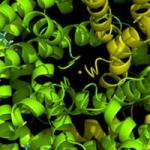
Research Topics
Pathological retinal cell demise and abnormal vessel growth can perturb the structure and morphology of the retina and lead to visual loss. If the cell death and/or angiogenesis are prevented, retinal degeneration can be restricted. Therefore, endogenous neurotrophic factors and angiogenic inhibitors are likely to play an important role in retinal protection. Understanding their chemistry, structure and biology is provoking intense clinical interest because of the roles that these factors play in retinopathies. These molecules hold promise in clinical retino-protection treatments, and elucidation of the mechanism of their actions is important for the development of therapies based on these natural factors and inhibitors.The major aims of the section include developing new tools for studying protein structure as it relates to retina function and mechanism of action of retinoprotective factors. Ongoing projects in the section include studies on pigment epithelium-derived factor (PEDF), a multifunctional SERPIN protein that acts in neuronal differentiation and survival, and prevents angiogenesis, tumor growth and metastasis. Studies of the individual activities of PEDF are challenged by the presence of other opposing properties of the same molecule. The research group mapped biologically active regions on the PEDF polypeptide, and identified binding partners and cell signaling receptors for this serpin that trigger different activities. The PEDF binding partners are also being investigated. Development of enzyme- and cell-based high throughput assays, lipid analyses and lipidomics, construction of animal models in which these proteins are involved, as well as development of peptide delivery systems for the retina of animal models of retinal degeneration are also included as projects in the section. Therapeutic applications of small molecules with potent retinoprotective activities are highly sought. The research goal is to lay the groundwork for the development of peptide-based therapies for retinal diseases, such as retinitis pigmentosa, age-related macular degeneration, diabetic retinopathy, and retinoblastoma.
Biography
Dr. Patricia Becerra received her Ph.D. in Biochemistry from the University of Navarra in 1979 studying lipid-protein interactions of liver mitochondria enzymes. She received postdoctoral research training with Dr. Samuel H. Wilson at the NCI studying enzymology of DNA polymerases and exonucleases, followed by training under the late Dr. James A. Rose at NIAID in molecular virology of AAV. She then returned to Dr. Wilson’s lab as an expert to study structure-function relationships of HIV reverse transcriptase. She joined NEI as a Visiting Scientist in 1991, became an Investigator in 1994, and was promoted to Principal Investigator in 2001 to study the biochemistry of PEDF, a neurotrophic and antiangiogenic factor for the retina. The interests of her section are in protein structure as it relates to function, with a focus on the interactions of components involved in cell differentiation, survival and maintenance. Her research at NEI has applied these interests to systems in the retina.
Selected Publications
- Bernardo-Colón A, Bighinati A, Parween S, Debnath S, Piano I, Adani E, Corsi F, Gargini C, Vergara N, Marigo V, Patricia Becerra S. H105A peptide eye drops promote photoreceptor survival in murine and human models of retinal degeneration. Commun Med (Lond). 2025;5(1):81.
- Bernardo-Colón A, Dong L, Abu-Asab M, Brush RS, Agbaga MP, Becerra SP. Ablation of pigment epithelium-derived factor receptor (PEDF-R/Pnpla2) causes photoreceptor degeneration. J Lipid Res. 2023;64(5):100358.
- Rebustini IT, Crawford SE, Becerra SP. PEDF Deletion Induces Senescence and Defects in Phagocytosis in the RPE. Int J Mol Sci. 2022;23(14).
- Dixit S, Polato F, Samardzija M, Abu-Asab M, Grimm C, Crawford SE, Becerra SP. PEDF deficiency increases the susceptibility of rd10 mice to retinal degeneration. Exp Eye Res. 2020;198:108121.
- Kenealey J, Subramanian P, Comitato A, Bullock J, Keehan L, Polato F, Hoover D, Marigo V, Becerra SP. Small Retinoprotective Peptides Reveal a Receptor-binding Region on Pigment Epithelium-derived Factor. J Biol Chem. 2015;290(42):25241-53.
Related Scientific Focus Areas

Molecular Biology and Biochemistry
View additional Principal Investigators in Molecular Biology and Biochemistry



This page was last updated on Friday, August 22, 2025